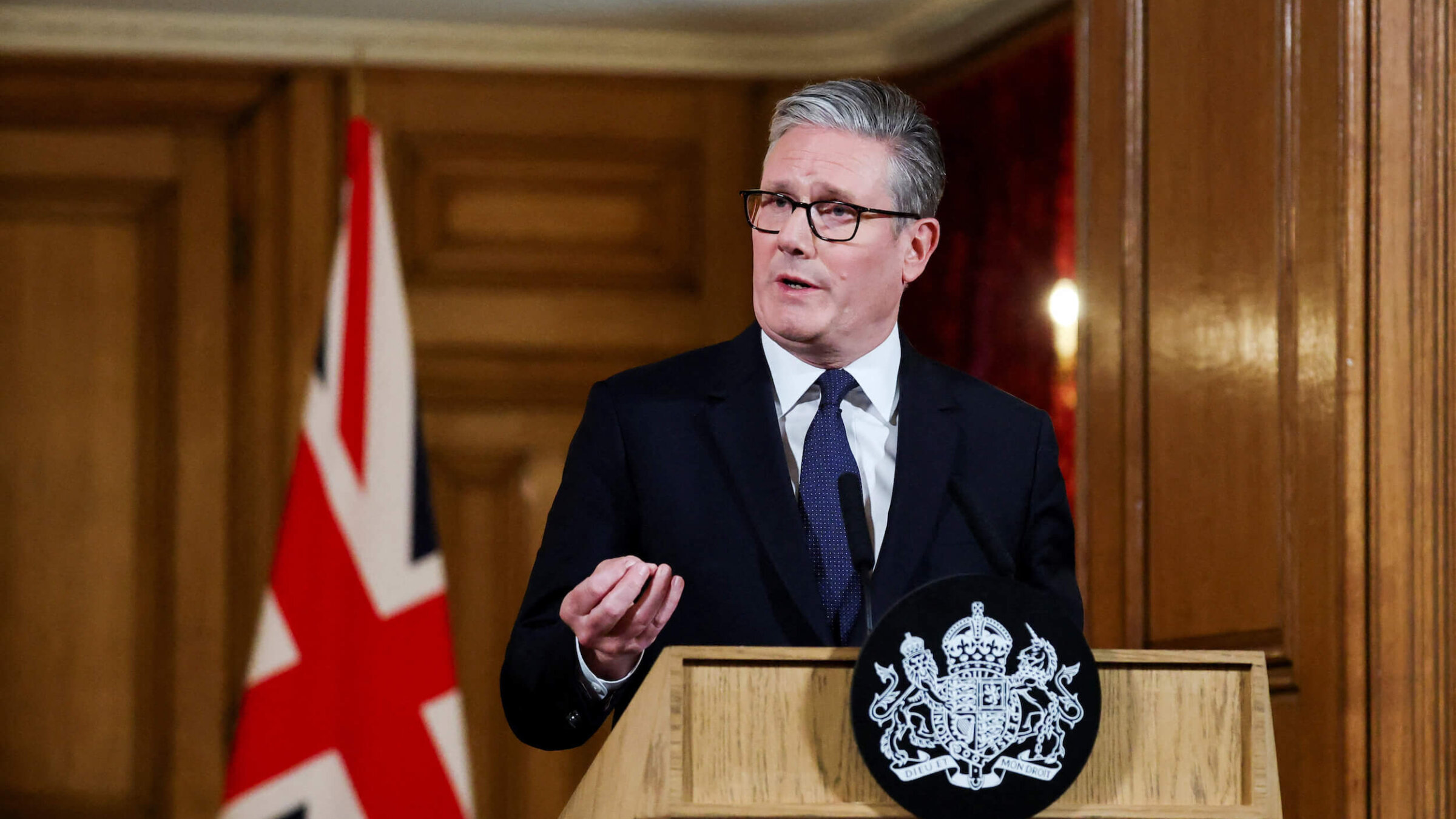Recognizing a Palestinian state is a great way to doom Palestinians
France and the UK risk reviving Hamas, and hardening Israeli resistance to any future deal

British Prime Minister Keir Starmer announces that the United Kingdom may recognize a Palestinian state in September, following an emergency cabinet meeting on Gaza in London on July 29. Photo by Toby Melville/Pool/AFP/Getty Images
If France and the United Kingdom proceed with their proposed unilateral recognition of a Palestinian state in the current climate, they will not be advancing peace. They will, instead, be throwing a political lifeline to Hamas, and triggering a hardened Israeli refusal to contemplate any future territorial concessions — precisely the opposite of what they intend.
Because recognition now would suggest that the most barbaric terrorism in the region’s history — the Oct. 7 massacre, which sparked the current war — has been rewarded. And that would all but guarantee that peace is postponed indefinitely.
The desire of France and the U.K. to do something in reaction to growing pressure over reports of widespread starvation in Gaza is understandable. France plans to recognize a Palestinian state at the United Nations General Assembly in September; the U.K., per a new announcement by Prime Minister Keir Starmer, will follow suit unless Israel meets complex conditions including agreeing to a ceasefire. Malnutrition in Gaza is a serious humanitarian concern that must be addressed. But it should not dictate strategic decisions in a century-old conflict with global implications — because it risks prompting decisions that, in their hastiness, could very well make things worse.
To understand why, one must first understand that Hamas has never depended on elite military capability. It is a low-intensity insurgency that thrives on ideology and despair. So while the group has been devastated militarily over the course of the war, it can still rebuild — if it’s able to once again establish a stronghold on any part of the Palestinian imagination.
The real question is not how many of Hamas’ gunmen remain in play, but whether the group maintains a foothold in Palestinian public opinion.
Recognition of a state now will make sure it does exactly that. The dangerous narrative that the Oct. 7 massacre was a necessary step toward Palestinian autonomy — not an inexcusable crime that guaranteed the devastation of Israelis and Palestinians alike — will be enshrined.
And that would be fatal not only to Israel’s sense of security, but to any hope of a two-state solution. So paradoxically, recognition now would not only embolden Hamas, but ensure that the very goal of recognition — a Palestinian state — becomes harder to achieve.
That’s in large part because Israel will not — and frankly, cannot — withdraw from the West Bank while Hamas remains standing. The geography is too sensitive. Jerusalem is surrounded on three sides. Israelis have seen what came out of Gaza, and they will never risk a repeat performance from the hilltops of the West Bank.
This is the inescapable logic of the moment. So long as Hamas exists as an armed and popular force, no Israeli government — left, right, or center — will agree to further land withdrawals, no matter the economic sanctions and global isolation that might ensue. Without further land withdrawals, there is no Palestinian state.
If the international community wants to help the Palestinians — and it should — there are more effective options they can pursue.
Pressure must be applied to end the war through an arrangement in which the Palestinian Authority returns to govern Gaza. Reconstruction aid should then be made conditional on Hamas stepping down and disarming.
But first, the world must stop pretending that Hamas can be accommodated or ignored.
And that is precisely what symbolic recognition of a Palestinian state does. Nearly 150 countries have already recognized Palestine. It has changed nothing, because the preconditions for a real state do not yet exist: There are no defined borders, as well as no unified government and no monopoly on force. Hamas controls Gaza. The Palestinian Authority, nominally in charge of the West Bank, is weak, corrupt, and marginalized. A state in name, under such conditions, is not a state at all. France and the U.K. adding their imprimatur to this movement, without decisive plans for the removal of Hamas, will bring it no closer to fruition.
Palestinian dignity, rights and eventual statehood are worthy goals. But they cannot be advanced by rewarding factions that reject peace and celebrate mass murder. This is not an argument against partition. On the contrary: partition is vital for Israel’s survival as both a Jewish and democratic state. Roughly 15 million people live between the river and the sea, split about evenly between Jews and Arabs. Without separation into two entities, Israel will either lose its Jewish majority or its democratic character. The logic of partition is inescapable — but the path toward it requires that Israelis feel secure.
They cannot do so while Hamas holds any power in the region. Many of those opposed to Palestinian statehood are not racists or zealots. They are terrified. And until that fear is addressed, they will not budge.
Used wisely, recognition is leverage. Used now, it is surrender — not to the Palestinians, but to their worst enemy. And that worst enemy is Hamas.

















